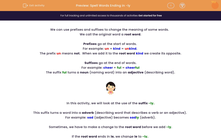We can use prefixes and suffixes to change the meaning of some words.
We call the original word a root word.
Prefixes go at the start of words.
For example: un + kind = unkind.
The prefix un means not. When we add it to the root word kind we create its opposite.
Suffixes go at the end of words.
For example: cheer + ful = cheerful
The suffix ful turns a noun (naming word) into an adjective (describing word).

In this activity, we will look at the use of the suffix -ly.
This suffix turns a word into a adverb (describing word that describes a verb or an adjective).
For example: sad (adjective) becomes sadly (adverb).
Sometimes, we have to make a change to the root word before we add -ly.
If the root word ends in le, we change le to -ly.
For example: humble (adjective) becomes humbly (adverb).
Did you spot the change?
If the root word ends in ic, we add -ally instead of -ly.
For example: dramatic (adjective) becomes dramatically (adverb).
Did you spot the change?
(Public is an exception to this rule - it becomes publicly)
Finally, there are some short words that end in e, and we need to remove this letter before adding -ly.
For example: true (adjective) becomes truly (adverb).
Did you spot the missing e?
.jpg)
Here are some examples of words that use these prefixes that we will practise in this activity:
gently
simply
basically
frantically
truly
wholly
You can listen to them here:
You can break the words up into the prefix and the root to help you to spell them
gent ly
simp ly
basic ally
frantic ally
tru ly
whol ly
Use Look, Say, Cover, Write, Check to practise spellings a few times before we begin the activities.
.jpg)








